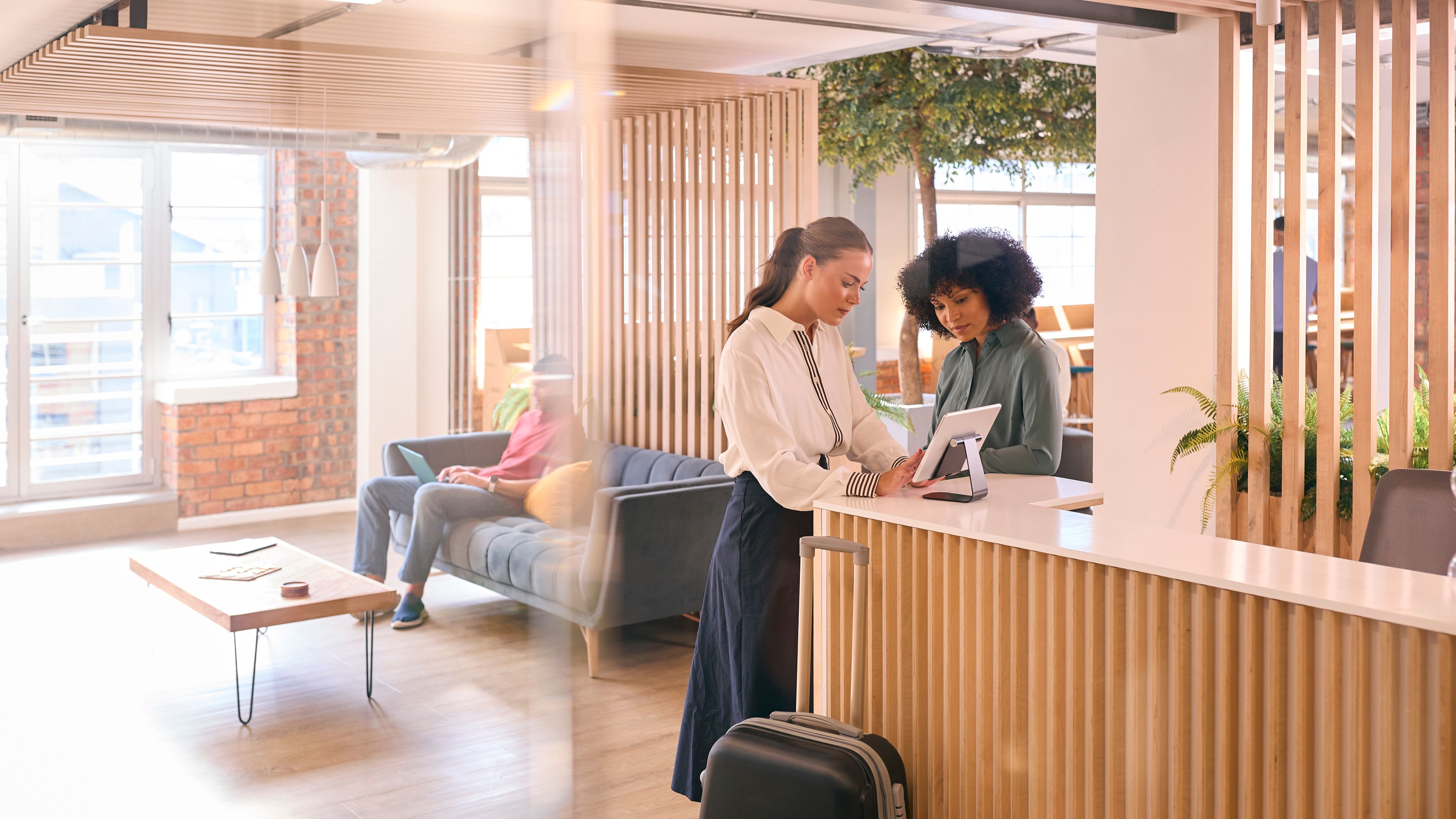ROOM FOR IMPROVEMENT
Are businesses doing enough to embed safety and inclusivity into their corporate hotel programmes? The jury is out


Imagine returning late from a business dinner only to discover your hotel room had been reassigned and your belongings moved, with staff unaware of their whereabouts. Or if a member of the hotel staff entered your room while you were in the shower? Or asleep? These aren*t hypothetical scenarios. They're all real-life incidents experienced by solo female business travellers, including this journalist.
※Every single woman that has travelled on business has a story, and most men have a story too, to be fair. Certainly, anybody who uses 'they/them' pronouns has a story,§ said Bex Deadman, co-founder of the Travel Risk Academy, which provides education and training in line with the ISO 31030 travel risk management standard.
According to Deadman, even organisations deeply committed to duty of care frequently miss the nuance of inclusivity when assessing safety and security protocols of accommodation providers within a managed programme.
※The reality is that the building of an accommodation programme is a procurement piece. It*s often outsourced to procurement teams or travel consultants. It is not done by security teams,§ says Deadman. ※[Security teams] may get asked to build a programme for high-risk countries, but that's a whole other piece, and I don't believe most companies have thought out a whole list of risk scenarios [in hotels] and practiced those or thought about them in any way.§
New research from the Global Business Travel Association appears to confirm this disconnect. In a survey of 234 travel managers across Europe and the US, only 38 per cent indicated safety and security as a top priority, ranking fourth overall when selecting accommodation partners. By contrast, 83 per cent prioritise company-negotiated rates and discounts, while 82 per cent prioritise properties located near their own offices, and 44 per cent select properties based on their proximity to clients* offices.
Even when safety and security are high on the agenda, Kayleigh Rogers, a consulting manager at American Express Global Business Travel warned that a hotel*s risk profile can be different for every traveller.
※There are a lot of key business destinations where a company will send their travellers to and, if you*re a member of LGBTQ+ community, or a solo female traveller, suddenly the risk profile shifts dramatically. A lot of properties should be treated as if they were in a high-risk destination,§ she says.
Rogers, who specialises in DE&I and travel risk management, says she recently worked with a client to identify locations with ※hidden risk§. This included working with internal stakeholders to identify additional questions for hotel RFPs and, importantly, to establish the role of risk mitigation in vendor management processes.
※It*s all good and well to ask [additional] questions, but what are you going to do with that information?§ she says. ※Do you then discount a provider if they don*t answer the question? What*s your threshold for the response? And how important is that factor if they*ve offered a much more competitive rate?§
Making accommodation more accessible
Travel management companies are sharpening focus on inclusivity, with examples including Amex GBT*s Travellers Requiring Specialty Assistance (TRSA) desk and FCM*s new Accessibility Desk, developed for energy giant Shell.
Both services offer bespoke hotel consultations and provide support for travellers with visible and non-visible disabilities and specific needs. This includes ensuring a hotel booking is suited to a travellers* specific needs ※because there are lots of different criteria for an accessible room§ and arranging special requests such as the hiring of medical equipment, says Amex GBT consulting manager Kayleigh Rogers.
※We created [the TRSA desk] in response to a growing demand from customers,§ she says. ※With inclusivity comes duty of care and psychological safety.§
While FCM*s Accessibility Desk is currently ※exclusive§ to Shell, the TMC said ※we do have aspirations to expand this service§.

INCLUSION BY DESIGN

For Jade Oakley, founder of We Move Travel, a UK-based startup that provides inclusive travel solutions to corporates, safety and inclusivity are ※inextricably linked§.
※As a traveller, if you are not being seen and represented, your views are also not seen and represented, and therefore what makes you feel safe,§ she explains.
※There are a lot of traveller groups that are excluded [from hotel safety training processes] and the protocols that are in place are intermittent,§ Oakley says. ※Simple things 每 like calling out a room number aloud at check-in 每 can pose a safety risk. For some travellers, the perception of risk, and of not feeling safe, can cause almost as much anxiety and stress as actual physical incidents.§
She adds: ※We need to reach out of the one-size-fits all traveller profile to look at who is actually travelling and what they actually need.§
This approach was recently introduced at the design and engineering firm AtkinsR谷alis, where travel procurement manager Adam Hickingbotham has implemented an accessible hotels programme across the UK. This initiative is specifically tailored to meet the needs of travellers with both visible and non-visible disabilities.
※As part of the hotel RFP, we now have a very stringent questionnaire around security and wellbeing,§ Hickingbotham says. This includes ※at least 20 questions§ that enquire about everything from first aid training and guest safety briefings, to CCTV, door locks in guest rooms, and DE&I policy.
The team also conducted extensive vetting 每 with nearly 100 site visits and video inspections 每 where they asked an additional set of in-depth questions.
※It's a lot easier to have that conversation [with hotel partners], and actually it*s been really good because they've learned from it as well,§ he says.
Hickingbotham also periodically asks travellers to check on vetted hotels ※almost like a mystery shopper# so we get a sanity check to understand [what*s happening on the ground]§.
To date, 30 properties in the UK have fulfilled all the accessibility criteria and now appear in the company's online booking tool with a gold accessibility logo.
Hickingbotham said it took more than a year to refine his hotel due diligence checks, and in 2026 he*s hoping to extend the accessible hotels programme to the US and Canada. ※We've got a boilerplate now. We've got all the questions in the RFP, and we know what we're doing,§ he said.


LOCAL NUANCE, GLOBAL EXPECTATIONS

Katie Garrahy, global travel manager at Wood PLC, is currently restructuring the company*s global hotel programme with safety as a foundational principle. ※For us, duty of care isn't just a policy 每 it*s woven into the fabric of how we operate,§ she says, adding that the consulting and engineering company*s &Make it Home* campaign is ※the heartbeat of our travel communications# and means everyone working on behalf of Wood has the right to return home safely§.
This will also feed into the company*s upcoming global hotel RFP, where properties must meet minimum safety and security requirements. ※Cost is important, but so too is having the right health and safety accreditations,§ she says.
Wood*s travel programme includes regular corporate travel as well as rotational offshore travel that encompasses long-stay accommodation options across 60 countries, so ※local nuances§ often need to be considered in line with global safety standards.
※There*s a bit of give and take and applying of some common sense,§ Garrahy says. Wood*s travel department works closely with internal security teams as well as the company*s TMC to understand what ※compromises§ might be needed in specific countries to ensure they can access the breadth of accommodation that is required by their travellers.
There are, of course, several ※non-negotiables§ such as verified fire safety measures, secure entry systems, access to a 24/7 reception and hygiene standards that meet international best practices.
※In high-risk or remote environments, we go further 每 working closely with HSE and security teams to validate properties before use. If a property doesn*t meet these standards, it is not included in our programme,§ she says.
New tech for risk compliance
To make risk assessment easier, Travel Risk Academy and Mysa, a corporate accommodation platform, are developing a compliance roadmap for hotels. This framework includes nine core areas 每 from perimeter security and data protection to emergency preparedness and ※vulnerable§ traveller safety and check-in procedures.
※This will create a level playing field for all properties 每 albeit with a few variation,§ says Mysa founder and CEO, Gary Hurst.
According to Hurst, the roadmap will establish a ※minimum level of conformity§ among accommodation providers, which will be fed into Mysa*s VerifyIQ compliance engine and used to deliver ※evidence-backed§ risk assessments. This currently includes photographic and video evidence, while Hurst says HoloLens-enabled AR walkthroughs will also soon be added to the mix. ※The travel manager has access to this as part of their procurement process, but the risk management team can also access the technology and will also be able to assess a particular hotel from their perspective.§

Building trust, encouraging feedback
Traveller engagement is another key component to building a resilient and inclusive accommodation programme, according to Patience Ogunruku, business development manager at risk management provider World Travel Protection.
※One of the biggest barriers is a lack of trust,§ Ogunruku says. ※Travellers often don*t understand duty of care and a lot of gaps [in a travel risk management programme] are related to individual employees not trusting or wanting to share information.§
To close that gap, Ogunruku encourages travel managers to educate employees on their support systems and make it easy to provide feedback.
Carolyn Pearson, CEO of business travel safety specialist Maiden Voyage, says the &behind-the-scenes* nature of a corporate travel manager*s role means employees don*t always realise someone in the company is responsible for their welfare.
※They're often not the rock stars within the organisation, so people don't know that somebody's in that role that cares for them and can actually do something about it,§ she says.
This makes responsiveness all the more critical. AtkinsR谷alis* Hickingbotham recalls removing a hotel from the programme after receiving repeated complaints from travellers about suspected drug use in public areas.
※We take complaints very seriously,§ he says. ※As a travel manager, you need to be as reactive as possible because it*s our duty of care to take hold of the programme. There will always be [risk factors] that are out of our control, and that*s why we also need to educate travellers about the importance of booking through approved channels 每 and the crisis management systems that come with that.§









